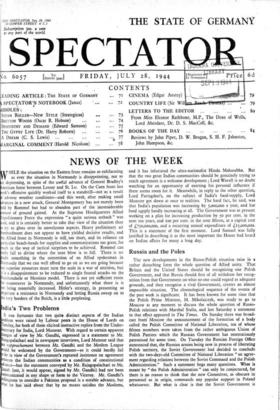ndia's Two Problems
It was fortunate that two quite distinct aspects of the Indian roblem were raised by Labour peers in the House of Lords on uesday, for both of them elicited instructive replies from the Under- retary for India, Lord Munster. With regard to certain apparent ges of view by Mr. Gandhi, expressed in a statement to Mr. agopalachari and in newspaper interviews, Lord Munster said that Y rapprochement between Mr. Gandhi and the Moslem League ould be welcomed by the Government—as it could hardly fail be in view of the Government's repeated insistence on agreement tsveen the Indian communities as a condition of constitutional vance--but the statement conveyed by Mr. Rajagopalachari to Mr. Wash (not, it would appear, signed by Mr. Gandhi) had not been
unicated in any shape or form to the Viceroy. Mr. Gandhi's
gness to consider a Pakistan proposal is a notable advance, but at he has said about that by no means satisfies the Moslems,
and it has infuriated the ultra-nationalist Hindu Mahasabha. But that the two great Indian communities should be genuinely trying to reach agreement is a welcome development ; Lord Wavell is no doubt watching for an opportunity of exerting his personal influence if there seems room for it. Meanwhile, in reply to the other question, Lord Faringdon's, on the subject of India's food-supply, Lord Munster got down at once to realities. The hard fact, he said, was that India's population was increasing by 5,000,000 a year, and her food supply hardly increasing at all. The Government was at present working on a plan for increasing production by 5o per cent. in the next ten years, and ma per cent. in the next fifteen, at a capital cost of £750,000,000, and a recurring annual expenditure of £15,000,000. This is a statement of the first moment. Lord Samuel was fully justified in describing it as the most important the House had heard on Indian affairs for many a long day.


























